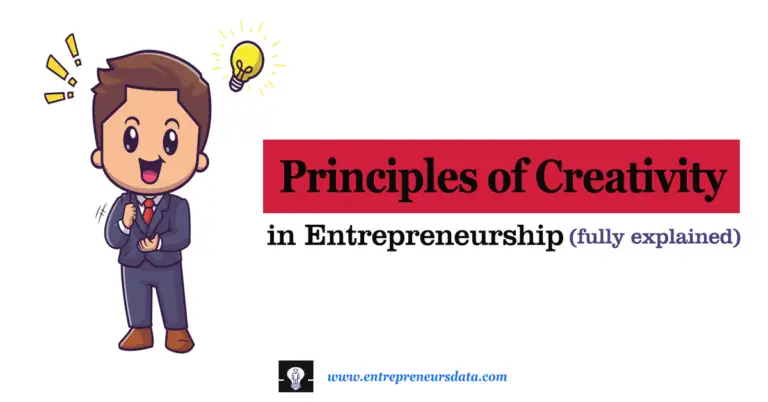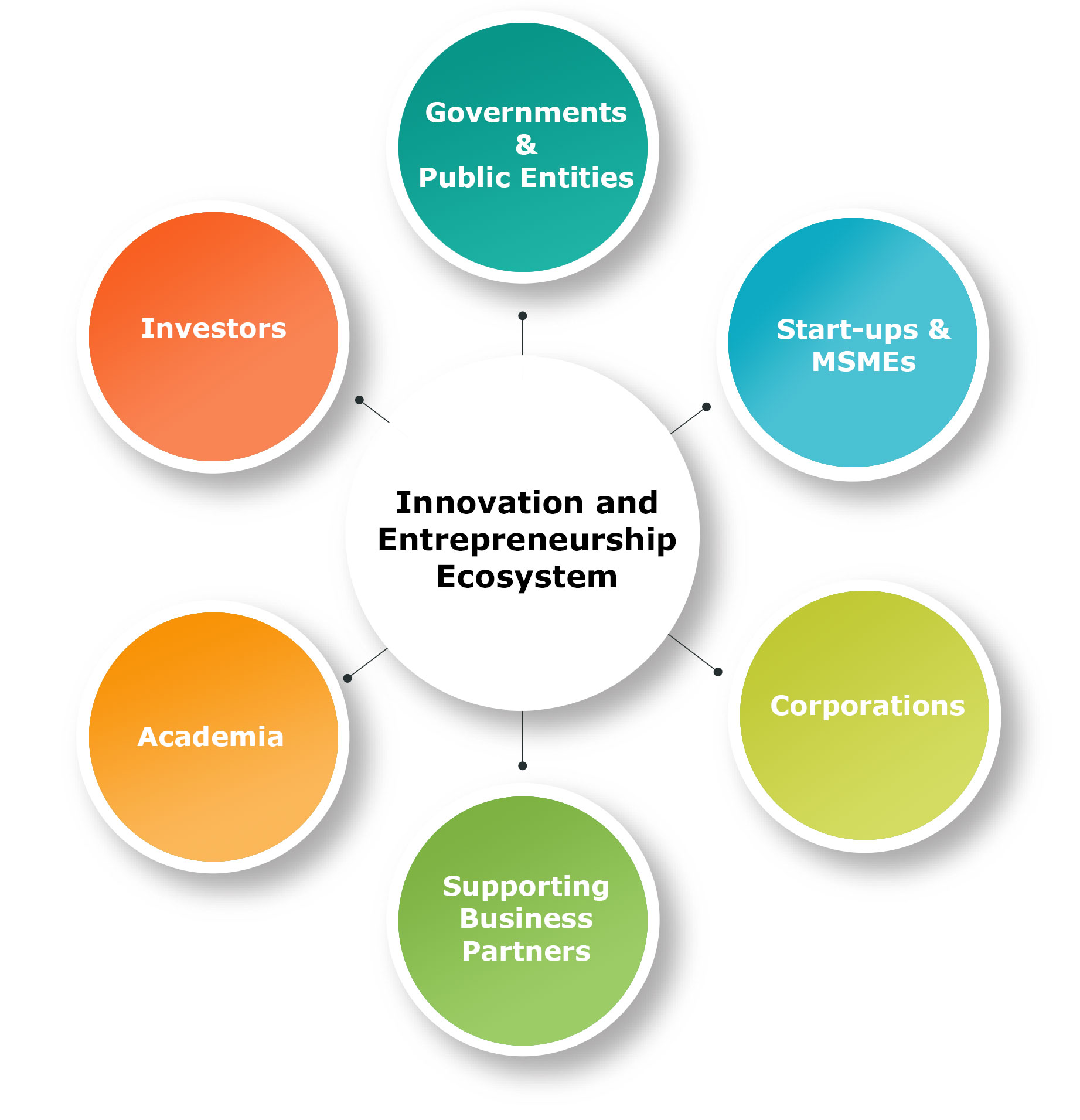

Tourism Entrepreneurship: Meaning, Characteristics & Examples
Tourism Entrepreneurship: Meaning, Characteristics & Examples – In the bustling world of travel and exploration, there exists a special breed of individuals who possess a unique blend of vision, innovation, and business acumen. They are the tourism entrepreneurs , creators, and managers of ventures that shape the experiences of travelers while driving economic growth within the tourism industry. But what exactly is tourism entrepreneurship?
This article delves into the meaning, characteristics, and examples of this fascinating field. From identifying opportunities to crafting unforgettable experiences, these entrepreneurs are the driving force behind the development of sustainable tourism ventures. Join us on a journey to explore the world of tourism entrepreneurship and discover the traits that make it a vibrant and essential component of the global travel landscape.
What Is Tourism Entrepreneurship?
Tourism entrepreneurship is an exciting realm where individuals with a passion for travel and a knack for business come together to create and manage ventures within the tourism industry. It involves identifying opportunities and developing innovative ideas to meet the needs and desires of travelers. Think of it as weaving together the threads of adventure, hospitality, and entrepreneurship to craft unique experiences.
Entrepreneurs in the tourism industry are trailblazers who succeed in their endeavors, whether they are launching a boutique hotel that offers distinctive travel experiences or creating an eco-tourism company that combines adventure with environmental protection. They can create deals that stand out from the competition since they have a solid understanding of the shifting demands and preferences of visitors.
Tourism Entrepreneurship is distinguished by its capacity to identify unrealized potential and capitalize on changing trends. Entrepreneurs that are successful concentrate on innovation, offering distinctive services, creating cutting-edge technology, and creating immersive experiences that make an impression on visitors. They make use of experiential tourism trends like farm-to-table food and eco-friendly activities to connect tourists with local culture and encourage sustainable practices.
Sustainability is a fundamental aspect of tourist entrepreneurship because entrepreneurs understand the need of preserving the environment, cultural heritage, and local communities. For instance, a wildlife refuge that prioritizes teaching and conservation boosts environmental awareness while boosting the local economy.
Read – Franchise Business in Entrepreneurship
Tourism Entrepreneurship Definitions
Tourism entrepreneurship is the process of identifying, evaluating, and exploiting opportunities to create new tourism businesses or to introduce new products, services, or practices into existing tourism businesses. – Sheldon (2017)
Tourism entrepreneurship is the process of creating, organizing, and managing a new tourism venture to turn a profit. – Aquino et al (2019)
Tourism entrepreneurship is the process of identifying and exploiting opportunities to create new tourism products, services, or experiences that meet the needs of tourists and create value for stakeholders. – Porter (2018)
Tourism entrepreneurship is the process of creating and managing new tourism businesses that are innovative, sustainable, and socially responsible. – Mottiar (2018)
The process of developing new tourist enterprises that are founded on a thorough grasp of the local context and that contribute to the sustainable growth of the destination is known as tourism entrepreneurship. – Peredo & Wurzelmann (2015)
Tourism entrepreneurship is the process of creating new tourism businesses that are motivated by a desire to make a difference in the world. – McCarthy (2008)
The process of starting new tourist enterprises that are motivated by a love of travel and a dedication to excellence is known as tourism entrepreneurship. – Jamal & Getz (1995)
Tourism entrepreneurship is the process of creating new tourism businesses that are based on a deep understanding of the tourism market and that can successfully compete in the global marketplace. – Crouch (2011)
tourist entrepreneurship is the process of establishing new tourist enterprises that can support the county’s social, economic, and environmental sustainability. – UNWTO (2010)
Read – Start a Business in Europe
Characteristics of Tourism Entrepreneurship
Innovation is a fundamental characteristic of tourism entrepreneurship. Successful tourism entrepreneurs constantly seek to differentiate themselves by introducing new and unique ideas, products, or services into the tourism market. For instance, consider the emergence of glamping (luxury camping) as an innovative concept within the tourism industry. By combining the thrill of outdoor adventure with the comfort and luxury of high-quality accommodation, glamping entrepreneurs have created a distinct niche that attracts travelers seeking a unique and memorable experience.
Market Sensitivity
Tourism entrepreneurs possess a keen awareness of market trends, consumer preferences, and evolving demands. They stay attuned to the changing needs of travelers and adjust their offerings accordingly. An excellent example of market sensitivity is the rise of eco-tourism ventures. Entrepreneurs recognized the growing demand for sustainable travel experiences and developed businesses that offer environmentally friendly activities and accommodations, such as wildlife conservation tours or eco-lodges.
Read – Large Company Entrepreneurship
Risk-Taking
Tourism entrepreneurship inherently involves taking calculated risks. Entrepreneurs are willing to step outside their comfort zones, invest their resources, and navigate uncertainties to pursue their ventures. An illustrative example is the launch of adventure tourism businesses in remote and challenging locations. These entrepreneurs take the risk of establishing operations in unexplored territories, offering activities like mountaineering, extreme sports, or wilderness expeditions, knowing that the thrill-seeking segment of tourists will seek out these unique and adventurous experiences.
Adaptability
The ability to adapt to changing circumstances and seize emerging opportunities is a crucial characteristic of successful tourism entrepreneurs. They understand that the tourism industry is dynamic, influenced by factors like technology advancements, global events, or shifting consumer behaviors. A prime example is the adaptation of traditional tour operators to the digital age. Entrepreneurs have embraced online platforms and booking systems, enabling them to reach a wider audience, provide seamless customer experiences, and respond swiftly to market changes.
Read – Cultural Entrepreneurship
Social Responsibility
Tourism entrepreneurship places a significant emphasis on social responsibility. Entrepreneurs strive to create businesses that not only generate economic benefits but also contribute positively to local communities, cultures, and environments. For instance, community-based tourism initiatives empower residents by involving them in tourism activities, preserving their cultural heritage, and sharing economic benefits. By doing so, entrepreneurs foster sustainable development and create a sense of pride and ownership among the local population.
Collaboration and Networking
Tourism entrepreneurs understand the value of collaboration and networking. They actively engage with stakeholders, including other entrepreneurs, industry professionals, local communities, and government agencies. By building strong partnerships, entrepreneurs can access resources, share knowledge, and create synergistic opportunities. An example is the establishment of destination marketing organizations (DMOs) where entrepreneurs collaborate and local authorities to collectively promote the destination and attract a larger volume of visitors.
Passion and Vision
Passion and a clear vision are vital driving forces for tourism entrepreneurs. They possess a deep love for travel and a genuine desire to make a difference in the industry. Entrepreneurs with a vision create businesses that align with their passions, ensuring they stay motivated and committed to their goals. For instance, an entrepreneur passionate about culinary arts may establish a food tour company that showcases authentic local cuisine, supports local eateries, and promotes culinary traditions to international visitors.
Read – Modern Entrepreneurship
Types of Tourism Entrepreneurship
Accommodation and hospitality.
This type of tourism entrepreneurship involves the establishment and management of accommodation facilities such as hotels, guesthouses, and resorts. Entrepreneurs in this field focus on providing comfortable and enjoyable lodging experiences for tourists. For example, an entrepreneur in the tourism industry may launch a boutique hotel. It offers specialized services, stylish décor, and innovative amenities to appeal to discriminating customers seeking a premium and memorable stay.
Food and Beverage
Food and beverage entrepreneurship in tourism revolves around creating dining experiences for travelers. Entrepreneurs in this domain establish restaurants, cafes, food trucks, or specialty food businesses that cater to the culinary preferences of tourists. They aim to offer delicious and diverse cuisine options, ranging from local delicacies to international flavors. An example is an entrepreneur who opens a seafood restaurant in a coastal destination, serving freshly caught seafood dishes to tourists who crave an authentic taste of the local marine cuisine.
Read – Corporate Partnerships
Adventure and Outdoor Recreation
Adventure and outdoor recreation tourism entrepreneurship focus on providing exciting and adventurous activities for travelers seeking thrilling experiences. Entrepreneurs in this field create ventures such as adventure tour companies, water sports centers, hiking, and trekking expeditions, or wildlife safaris. They cater to the interests of adventure enthusiasts by offering activities like white-water rafting, zip-lining, mountain biking, or wildlife encounters. For instance, an entrepreneur may establish a company that offers guided rock climbing trips in picturesque natural landscapes, providing adrenaline-pumping experiences for adventurous travelers.
Cultural and Heritage
Cultural and heritage tourism entrepreneurship centers around showcasing the local culture, traditions, and historical attractions of a destination. Entrepreneurs in this field create businesses such as guided heritage tours, cultural performances, museums, art galleries, or craft workshops. They aim to preserve and promote the cultural identity of a place while providing educational and enriching experiences for visitors. For example, an entrepreneur may establish a cultural center that offers interactive workshops on traditional arts and crafts, allowing tourists to engage with the local culture and learn traditional craftsmanship.
Read – Modern Business
Sustainable and Ecotourism
Sustainable and ecotourism entrepreneurship focuses on developing businesses that prioritize environmental conservation and sustainable practices. Entrepreneurs in this realm establish eco-lodges, nature-based tour operators, wildlife conservation initiatives, or sustainable transportation services. They aim to minimize the negative impact on the environment while promoting nature appreciation and conservation. An example is an entrepreneur who starts an eco-tour company offering guided hikes in protected areas, emphasizing the importance of preserving natural habitats and educating tourists about sustainable practices.
Specialized and Niche Tourism
Specialized and niche tourism entrepreneurship involves catering to specific interests, hobbies, or target markets within the tourism industry. Entrepreneurs in this category create ventures such as wellness retreats, wine and culinary tours, photography expeditions, adventure sports, or cultural festivals. They focus on providing tailored experiences and catering to the unique needs and preferences of niche segments. For instance, an entrepreneur may establish a company that offers guided bird-watching tours for bird enthusiasts, providing expert guides, specialized equipment, and access to prime bird-watching locations.
Read – C an Anyone Be an Entrepreneur
Popular Examples of Tourism Entrepreneurship
Founded in 2008, Airbnb is a prime example of tourism entrepreneurship. It revolutionized the accommodation sector by providing a platform for homeowners to rent out their properties to travelers. This innovative concept enabled individuals to become tourism entrepreneurs by turning their spare rooms or vacant properties into profitable accommodations. Airbnb disrupted the traditional hotel industry and opened up new opportunities for individuals to participate in the tourism economy.
G Adventures
G Adventures is a renowned adventure travel company that offers small group tours to destinations worldwide. Founded in 1990, it exemplifies tourism entrepreneurship in the adventure and outdoor recreation sector. The company was started by Bruce Poon Tip to provide authentic and sustainable travel experiences. G Adventures focuses on responsible tourism practices, supports local communities, and offers unique adventure itineraries, appealing to travelers seeking immersive and socially responsible experiences.
Lonely Planet
Lonely Planet is a well-known travel guidebook publisher that has been a trusted source of travel information for over four decades. Founded in 1973 by Tony Wheeler and his wife Maureen, it reflects tourism entrepreneurship in the publishing industry. Their travel guides provide comprehensive information, tips, and recommendations for travelers, enabling them to explore destinations independently. The secret to Lonely Planet’s success is its capability to satisfy the demands of curiosity. Also, daring visitors looking for real-world encounters.
Read – Businessman vs Entrepreneur
Viator is an online travel agency. They provide a large choice of tours, experiences, and activities in places all over the world. Rod Cuthbert launched it in 1995, and it is now a major participant in the tours and activities industry. Viator connects travelers with local tour operators, allowing them to book unique experiences conveniently. This platform showcases the entrepreneurial spirit by bringing together various tourism service providers and offering curated experiences for tourists.
Rick Steves’ Europe
Rick Steves, an American travel writer and television personality, is an example of an individual entrepreneur who has made significant contributions to tourism entrepreneurship. He has built a brand focused on European travel, sharing his expertise through guidebooks, television shows, and tours. Rick Steves’ Europe provides valuable insights, cultural information, and practical advice to travelers interested in exploring Europe independently. His entrepreneurial journey demonstrates how a passion for travel can be turned into a successful tourism enterprise.

The process of planning, establishing, and running new businesses within the tourist sector is referred to as tourism entrepreneurship . It is essential for promoting innovation, economic expansion, and job creation. tourism entrepreneurs display traits like innovation, flexibility, and a love for their business. They aid in the creation of distinctive tourism goods, services, and experiences through their entrepreneurial initiatives, which meet the changing demands of tourists.
The examples of Airbnb, G Adventures, Lonely Planet, Viator, and Rick Steves’ Europe showcase the diverse range of entrepreneurial ventures within the tourism sector. Ultimately, tourism entrepreneurship not only benefits individuals and businesses but also contributes to the overall sustainability and vibrancy of the tourism industry.
FAQs about Tourism Entrepreneurship
Why is entrepreneurship important in tourism.
Entrepreneurship is important in tourism as it drives innovation. Also, it boosts economic growth, and produces employment opportunities, leading to a vibrant and passionate tourism industry.
How can you relate entrepreneurship to tourism?
Entrepreneurship in tourism is evident through the creation of new businesses, innovative products, and unique experiences that cater to the evolving needs and desires of travelers.
What are the qualities of a tourism entrepreneur?
Qualities of a successful tourism entrepreneur include creativity, adaptability, passion for the industry, strong business acumen, a customer-centric mindset, and a willingness to take calculated risks.
What are the entrepreneurial opportunities in tourism?
Entrepreneurial opportunities in tourism encompass various areas such as starting accommodation establishments, developing niche tours and activities, leveraging technology for online booking platforms, and promoting sustainable and responsible tourism practices.
Why is entrepreneurship important in hospitality and tourism?
Entrepreneurship plays a vital role in hospitality and tourism by driving competitiveness, spurring the development of new hospitality ventures, enhancing guest experiences through innovative services, and contributing to the overall growth and success of the industry.
Similar Posts

Corporate Entrepreneurship Advantages and Disadvantages (Fully Explained)
Corporate Entrepreneurship Advantages and Disadvantages:- Corporate Entrepreneurship is one of the emerging fields of entrepreneurship in today’s digital world.

Entrepreneurial Process: Meaning, Overview & Stages
Entrepreneurial process call as a venture creation process. The characteristics of the venture creation process belong to the maximum relevant topics of contemporary nascent entrepreneurship (entrepreneurs who are underway to start a company). There are two predominant reasons why it is critical to analyze the entrepreneurial process.

Technopreneurship: Meaning, History, Importance, Problems & Examples
Technopreneurship is a business term that refers to entrepreneurs who specialize in the area of information technology. We can identify Technopreneurship as a new breed of entrepreneurship in this digital era.

Creativity and Principles of Creativity in Entrepreneurship (Fully Explained)
Creativity is defined as the creation of a valued, useful new product, service, idea, procedure, or process by persons working together in a composite social system. In this article, you can learn What is Creativity Principles of Creativity Expertise in Creativity Creative Thinking in Creativity Creative Thinking function Creative Thinking components Motivation in Creativity Two…

Power of SMART Goal-Setting in Entrepreneurship
Zig Ziglar once said that goals are not obstacles; they are destinations. They show you where you want to go, what you want to accomplish.’ In the dynamic realm of entrepreneurship, setting goals becomes the compass guiding. Especially it helps ventures to go through uncharted territories towards success. This article delves into the multifaceted world of entrepreneurial goal-setting, exploring the intrinsic motivations, and the transformative power of SMART goals. Also, the diverse categories of entrepreneurial objectives, real-world examples illuminating the path, and indispensable tips on crafting SMART goals.

Strategic Development: From Vision to Victory
Embarking on the entrepreneurial journey is akin to setting sail into the vast unknown, and in this ever-evolving landscape, strategic development becomes the entrepreneurial compass. What exactly is strategic development? It’s not just a term. It’s the heartbeat of entrepreneurial strategy. In this article from “Strategic Development: From Vision to Victory,” we’ll delve into the very essence of this concept, unravelling its definition, understanding its real-world implications through examples, and discovering when new strategies become imperative.

Leave a Reply Cancel reply
Your email address will not be published. Required fields are marked *
Save my name, email, and website in this browser for the next time I comment.
To read this content please select one of the options below:
Please note you do not have access to teaching notes, entrepreneurship and entrepreneurs in tourism.
The Emerald Handbook of Entrepreneurship in Tourism, Travel and Hospitality
ISBN : 978-1-78743-530-8 , eISBN : 978-1-78743-529-2
Publication date: 11 July 2018
The aim of this chapter is to discuss and highlight the importance of entrepreneurship and entrepreneurs in tourism in order to engage the reader in the central topic of the handbook.
Methodology/approach
A literature review was conducted on conceptual issues and practical aspects of entrepreneurs and entrepreneurship. Case studies are included to illustrate the role and contribution of entrepreneurs in the tourism field.
This chapter highlights (1) practical definitions of the terms entrepreneurs and entrepreneurship; (2) main features of tourism entrepreneurs; and (3) the role of entrepreneurs in tourism activities and their contribution to the development of a tourism destination.
Research limitations/implications
This chapter is explorative in nature, because the discussion is mostly based on a literature review. Thus, more research-based knowledge and more empirical studies are needed in this field.
Practical implications
The chapter presents the main features and characteristics of individuals involved in entrepreneurship, as well as the need for developing the appropriate skills for successful business ventures.
Originality/value
This chapter deals with the question of why tourism entrepreneurship is so important in the contemporary context and in the business environment of tourism. The practical and entrepreneurial approach of the book is also discussed.
- Entrepreneurs
- Entrepreneurship
- Tourism-related industries
- Contribution
Sotiriadis, M. (2018), "Entrepreneurship and Entrepreneurs in Tourism", Sotiriadis, M. (Ed.) The Emerald Handbook of Entrepreneurship in Tourism, Travel and Hospitality , Emerald Publishing Limited, Leeds, pp. 3-17. https://doi.org/10.1108/978-1-78743-529-220181001
Emerald Publishing Limited
Copyright © 2018 Emerald Publishing Limited
We’re listening — tell us what you think
Something didn’t work….
Report bugs here
All feedback is valuable
Please share your general feedback
Join us on our journey
Platform update page.
Visit emeraldpublishing.com/platformupdate to discover the latest news and updates
Questions & More Information
Answers to the most commonly asked questions here
UN Tourism | Bringing the world closer

share this content
- Share this article on facebook
- Share this article on twitter
- Share this article on linkedin
What is innovation?
Innovation in tourism, as elsewhere, is collaborative action between governments, academia, corporations, micro, small and medium enterprises (MSMEs) and start-ups, investors, supporting business partners (accelerators, incubators, etc.) and other stakeholders. Fostering a successful tourism innovation and entrepreneurial ecosystem requires connecting all stakeholders to collaboration opportunities and prioritizing capacity building in tourism and technology.

Governments & Public Entities policies that foster innovation, trade and the adoption of technologies, generally promote innovation in tourism
Academia create frameworks and models on sustainable innovation in tourism, smart destinations, contribute knowledge to Governments, Startups, MSMEs and Startups and Supporting Business Partners
Corporations develop new technologies, raise awareness internally about innovation, and implement an organizational structure and vision for technology, invest in open innovation
Start-ups & MSMEs (micro, small and medium enterprises) develop and implement disruptive technologies in tourism, satisfy and reflect the needs and demands of travelers, create innovative solutions in tourism that support the SDGs
Investors invest in sustainable projects related to tourism and technology, support the growth and internationalization of Corporations, Destinations and MSMEs and Startups
Supporting Business Partners support Startups that are directly or indirectly impacting the tourism value chain
- Branch Structure
- News Currently selected

Tourism Enterprises
Template:Tourism Enterprises Nav

Tourism Enterprises has been designed to provide you with a broad understanding of business operations within a tourism organisation. This specialty has been set up as a project - you get to start up and run your own bed and breakfast establishment. During your journey you will look at marketing, financial planning, managerial skills, recruitment, and operating and information systems requirements.
- 1 This course is used in the following programme
- 2 Learning support
- 3.1 Be familiar with operations and information systems in tourism
- 3.2 Have a basic understanding of financial systems used within a tourism organisation
- 3.3 Be able to examine and analyse marketing techniques in a tourism organisation
- 3.4 Have a good understanding of the skills required for staff working in the tourism industry
- 3.5 Administration
- 4 Related courses
This course is used in the following programme
- Travel and Tourism
Learning support
- Otago Polytechnic offers learning support and assessment services through the Tourism Enterprises weblog .
- Course schedule - a time table for when the next course will start and the periods in which the study will be supported by teachers and learning facilitators.
Be familiar with operations and information systems in tourism
Have a basic understanding of financial systems used within a tourism organisation, be able to examine and analyse marketing techniques in a tourism organisation, have a good understanding of the skills required for staff working in the tourism industry, administration, related courses.
- Tour Guiding
- Travel Operations
- Conference and Events
- Cook Islands Tourism
- Sustainable Tourism
- Adventure Tourism
- Wholesale Tour Operations
- Reception Services
- Heritage Tourism
- Pages Containing CC-BY Images
- Pages with Images from Flickr
- Otago Polytechnic
Navigation menu
Personal tools.
- Request account
- View source
- View history
- Recent changes
- Practice editing
- Community portal
- Mailing list
Print/export
- Create a book
- Download as PDF
- Printable version
- What links here
- Related changes
- Upload file
- Special pages
- Permanent link
- Page information
- This page was last modified on 14 June 2010, at 20:20.
- This page has been accessed 20,528 times.
- Content is available under the Creative Commons Attribution Share Alike License unless otherwise noted.
- Privacy policy
- About WikiEducator
- Disclaimers
Social Entrepreneurship in Tourism, Hospitality and Events: A State of the Art
- First Online: 08 April 2022
Cite this chapter

- Mert Gürlek 4
Part of the book series: Tourism, Hospitality & Event Management ((THEM))
728 Accesses
2 Citations
Social entrepreneurship (SE) plays a significant role in the solution of social problems and is therefore considered among the main drivers of sustainable development. The tourism, hospitality and events industries have the potential to create social value for social groups such as the poor, disadvantaged groups, homeless and the unemployed, with the economic growth they have created. However, no research has been found examining what progress is made in the SE literature of the tourism, hospitality and events field. Therefore, this chapter aims to review the research on SE in the field of tourism, hospitality and events. To achieve this, 30 studies from 17 different journals were examined within the scope of this chapter. Using content analysis, the level of development and current trends in the research on SE, the theoretical perspectives and research methods used were examined and then a research agenda for future research was created.
This is a preview of subscription content, log in via an institution to check access.
Access this chapter
- Available as PDF
- Read on any device
- Instant download
- Own it forever
- Available as EPUB and PDF
- Compact, lightweight edition
- Dispatched in 3 to 5 business days
- Free shipping worldwide - see info
- Durable hardcover edition
Tax calculation will be finalised at checkout
Purchases are for personal use only
Institutional subscriptions
Albert, M. (1992). Kapitalizme Karşı Kapitalizm [Capitalism vs. Capitalism] (C. Oktay & H. Dilli, Trans.). Afa.
Google Scholar
Altinay, L., Sigala, M., & Waligo, V. (2016). Social value creation through tourism enterprise. Tourism Management, 54 , 404–417.
Article Google Scholar
Alvord, S. H., Brown, L. D., & Letts, C. W. (2004). Social entrepreneurship and societal transformation: An exploratory study. The Journal of Applied Behavioral Science, 40 (3), 260–282.
Aquino, R. S., Lück, M., & Schänzel, H. A. (2018). A conceptual framework of tourism social entrepreneurship for sustainable community development. Journal of Hospitality and Tourism Management, 37 , 23–32.
Bacq, S., & Janssen, F. (2011). The multiple faces of social entrepreneurship: A review of definitional issues based on geographical and thematic criteria. Entrepreneurship & Regional Development, 23 (5–6), 373–403.
Bacq, S., & Lumpkin, G. T. (2020). Social entrepreneurship and COVID-19. Journal of Management Studies, 58 (1), 285–288.
Bacq, S., Geoghegan, W., Josefy, M., Stevenson, R., & Williams, T. A. (2020). The COVID-19 Virtual Idea Blitz: Marshaling social entrepreneurship to rapidly respond to urgent grand challenges. Business Horizons, 63 (6), 705–723.
Beckmann, M., & Zeyen, A. (2014). Franchising as a strategy for combining small and large group advantages (logics) in social entrepreneurship: A Hayekian perspective. Nonprofit and Voluntary Sector Quarterly, 43 (3), 502–522.
Boschee, J., & McClurg, J. (2003). Toward a better understanding of social entrepreneurship: Some important distinctions . Working Paper. Accessed March 26, 2021, from http://www.se-alliance.org/better_understanding.pdf
Bozhikin, I., Macke, J., & da Costa, L. F. (2019). The role of government and key non-state actors in social entrepreneurship: A systematic literature review. Journal of Cleaner Production, 226 , 730–747.
Brooks, A. C. (2009). Social entrepreneurship: A modern approach to social value creation . Pearson Prentice Hall.
Butkevičiene, E. (2009). Social innovations in rural communities: Methodological framework and empirical evidence. Social Sciences/Socialiniai Mokslai, 1 (63), 80–88.
Calás, M. B., Smircich, L., & Bourne, K. A. (2009). Extending the boundaries: Reframing “entrepreneurship as social change” through feminist perspectives. Academy of Management Review, 34 ( 3 ), 552 – 569 .
Canestrino, R., Ćwiklicki, M., Magliocca, P., & Pawełek, B. (2020). Understanding social entrepreneurship: A cultural perspective in business research. Journal of Business Research, 110 , 132–143.
Certo, S. T., & Miller, T. (2008). Social entrepreneurship: Key issues and concepts. Business Horizons, 51 (4), 267–271.
Chen, S., & Ravallion, M. (2010). The developing world is poorer than we thought, but no less successful in the fight against poverty. The Quarterly Journal of Economics, 125 (4), 1577–1625.
Dacin, P. A., Dacin, M. T., & Matear, M. (2010). Social entrepreneurship: Why we don’t need a new theory and how we move forward from here. Academy of Management Perspectives, 24 (3), 37–57.
Dahles, H., Khieng, S., Verver, M., & Manders, I. (2020). Social entrepreneurship and tourism in Cambodia: Advancing community engagement. Journal of Sustainable Tourism, 28 (6), 816–833.
De Lange, D., & Dodds, R. (2017). Increasing sustainable tourism through social entrepreneurship. International Journal of Contemporary Hospitality Management, 29 (7), 1977–2002.
Dwivedi, A., & Weerawardena, J. (2018). Conceptualizing and operationalizing the social entrepreneurship construct. Journal of Business Research, 86 , 32–40.
Edmondson, A. C., & McManus, S. E. (2007). Methodological fit in management field research. Academy of Management Review, 32 (4), 1246–1264.
Ergül, M., & Johnson, C. (2011). Social entrepreneurship in the hospitality and tourism industry: An exploratary approach. Consortium Journal of Hospitality & Tourism, 16 (2), 40–46.
Fu, H., Okumus, F., Wu, K., & Köseoglu, M. A. (2019). The entrepreneurship research in hospitality and tourism. International Journal of Hospitality Management, 78 , 1–12.
Gupta, P., Chauhan, S., Paul, J., & Jaiswal, M. P. (2020). Social entrepreneurship research: A review and future research agenda. Journal of Business Research, 113 , 209–229.
Gürlek, M., & Uygur, A. (2021). Service-oriented high-performance human resource practices and employee service performance: A test of serial mediation and moderation models. Journal of Management & Organization, 27 (1), 197–233.
Gürlek, M., & Köseoglu, M. A. (2021). Green innovation research in the field of hospitality and tourism: The construct, antecedents, consequences, and future outlook. The Service Industries Journal. https://doi.org/10.1080/02642069.2021.1929930
Gürlek, M., & Kılıç, İ. (2021). A true friend becomes apparent on a rainy day: corporate social responsibility practices of top hotels during the COVID-19 pandemic. Current Issues in Tourism, 24 (7), 905–918.
Gürlek, M., & Çemberci, M. (2020). Understanding the relationships among knowledge-oriented leadership, knowledge management capacity, innovation performance and organizational performance. Kybernetes, 49 (11), 2819–2846.
Haugh, H. M., & Talwar, A. (2016). Linking social entrepreneurship and social change: The mediating role of empowerment. Journal of Business Ethics, 133 (4), 643–658.
Hesse-Biber, S. (2010). Qualitative approaches to mixed methods practice. Qualitative Inquiry, 16 ( 6 ), 455–468.
Higgins-Desbiolles, F., Moskwa, E., & Wijesinghe, G. (2019). How sustainable is sustainable hospitality research? A review of sustainable restaurant literature from 1991 to 2015. Current Issues in Tourism, 22 (13), 1551–1580.
Hofer, K. M., & Knight, G. (2020). International services marketing: An integrative assessment of the literature 国际化服务行业市场营销: 综合文献分析. The Service Industries Journal , 1–24.
Jørgensen, M. T., Hansen, A. V., Sørensen, F., Fuglsang, L., Sundbo, J., & Jensen, J. F. (2021). Collective tourism social entrepreneurship: A means for community mobilization and social transformation. Annals of Tourism Research, 88 , 103171.
Kalargyrou, V., Kalargiros, E., & Kutz, D. (2020). Social entrepreneurship and disability inclusion in the hospitality industry. International Journal of Hospitality & Tourism Administration, 21 (3), 308–334.
Kimbu, A. N., & Ngoasong, M. Z. (2016). Women as vectors of social entrepreneurship. Annals of Tourism Research, 60 , 63–79.
Köseoglu, M. A. (2020). Identifying the intellectual structure of fields: Introduction of the MAK approach. Scientometrics, 125 (3), 2169–2197.
Lettice, F., & Parekh, M. (2010). The social innovation process: Themes, challenges and implications for practice. International Journal of Technology Management, 51 , 19–158.
Mair, J., & Marti, I. (2006). Social entrepreneurship research: A source of explanation, prediction, and delight. Journal of World Business, 41 (1), 36–44.
Martin, P. Y., & Turner, B. A. (1986). Grounded theory and organizational research. The Journal of Applied Behavioral Science, 22 ( 2 ), 141–157.
Mehmetoglu, M., & Altinay, L. (2006). Examination of grounded theory analysis with an application to hospitality research. International Journal of Hospitality Management, 25 ( 1 ), 12–33.
Memili, E., Fang, H. C., Koc, B., Yildirim-Öktem, Ö., & Sonmez, S. (2018). Sustainability practices of family firms: The interplay between family ownership and long-term orientation. Journal of Sustainable Tourism, 26 (1), 9–28.
Méndez-Picazo, M. T., Galindo-Martín, M. A., & Castaño-Martínez, M. S. (2021). Effects of sociocultural and economic factors on social entrepreneurship and sustainable development. Journal of Innovation & Knowledge, 6 (2), 69–77.
Montgomery, A. W., Dacin, P. A., & Dacin, M. T. (2012). Collective social entrepreneurship: Collaboratively shaping social good. Journal of Business Ethics, 111 (3), 375–388.
Mottiar, Z. (2016). Exploring the motivations of tourism social entrepreneurs: The role of a national tourism policy as a motivator for social entrepreneurial activity in Ireland. International Journal of Contemporary Hospitality Management, 28 ( 6 ), 1137–1154.
Mottiar, Z., Boluk, K., & Kline, C. (2018). The roles of social entrepreneurs in rural destination development. Annals of Tourism Research, 68 , 77–88.
Neumeier, S. (2012). Why do social innovations in rural development matter and should they be considered more seriously in rural development research? Proposal for a stronger focus on social innovations in rural development research. Sociologia Ruralis, 52 , 48–69.
Nicholls, A. (2010). The legitimacy of social entrepreneurship: Reflexive isomorphism in a pre-paradigmatic field. Entrepreneurship Theory and Practice, 34 (4), 611–633.
Ormiston, J., & Seymour, R. (2011). Understanding value creation in social entrepreneurship: The importance of aligning mission, strategy and impact measurement. Journal of Social Entrepreneurship, 2 (2), 125–150.
Phillips, W., Lee, H., Ghobadian, A., O’Regan, N., & James, P. (2015). Social innovation and social entrepreneurship: A systematic review. Group & Organization Management, 40 (3), 428–461.
Rahdari, A., Sepasi, S., & Moradi, M. (2016). Achieving sustainability through Schumpeterian social entrepreneurship: The role of social enterprises. Journal of Cleaner Production, 137 , 347–360.
Ratten, V. (2020). Coronavirus (covid-19) and social value co-creation. International Journal of Sociology and Social Policy. https://doi.org/10.1108/IJSSP-06-2020-0237
Rey-Martí, A., Ribeiro-Soriano, D., & Palacios-Marqués, D. (2016). A bibliometric analysis of social entrepreneurship. Journal of Business Research, 69 (5), 1651–1655.
Selsky, J. W., & Parker, B. (2005). Cross-sector partnerships to address social issues: Challenges to theory and practice. Journal of Management, 31 , 849–873.
Sheldon, P., Pollock, A., & Daniele, R. (2017). Social entrepreneurship and tourism: Setting the stage. In P. J. Sheldon & R. Daniele (Eds.), Social entrepreneurship and tourism: Philosophy and practice (pp. 1–18). Springer International.
Chapter Google Scholar
Short, J. C., Moss, T. W., & Lumpkin, G. T. (2009). Research in social entrepreneurship: Past contributions and future opportunities. Strategic Entrepreneurship Journal, 3 ( 2 ), 161–194.
Sigala, M. (2016). Learning with the market: A market approach and framework for developing social entrepreneurship in tourism and hospitality. International Journal of Contemporary Hospitality Management, 28 (6), 1245–1286.
Sigala, M. (2019). A market approach to social value co-creation: Findings and implications from “Mageires” the social restaurant. Marketing Theory, 19 (1), 27–45.
Sloan, P., Legrand, W., & Simons-Kaufmann, C. (2014). A survey of social entrepreneurial community-based hospitality and tourism initiatives in developing economies: A new business approach for industry. Worldwide Hospitality and Tourism Themes .
Tölkes, C. (2018). Sustainability communication in tourism–A literature review. Tourism Management Perspectives, 27 , 10–21.
von der Weppen, J., & Cochrane, J. (2012). Social enterprises in tourism: An exploratory study of operational models and success factors. Journal of Sustainable Tourism, 20 ( 3 ), 497–511.
Wang, C., Duan, Z., & Yu, L. (2016). From nonprofit organization to social enterprise: The paths and future of a Chinese social enterprise in the tourism field. International Journal of Contemporary Hospitality Management, 28 (6), 1287–1306.
Wu, J., & Si, S. (2018). Poverty reduction through entrepreneurship: Incentives, social networks, and sustainability. Asian Business & Management, 17 (4), 243–259.
Xin, S., Tribe, J., & Chambers, D. (2013). Conceptual research in tourism. Annals of Tourism Research, 41 , 66–88.
Zahra, S. A., Gedajlovic, E., Neubaum, D. O., & Shulman, J. M. (2009). A typology of social entrepreneurs: Motives, search processes and ethical challenges. Journal of Business Venturing, 24 , 519–532.
Zhang, D. D., & Swanson, L. A. (2014). Linking social entrepreneurship and sustainability. Journal of Social Entrepreneurship, 5 (2), 175–191.
Download references
Author information
Authors and affiliations.
Burdur Mehmet Akif Ersoy University, Burdur, Turkey
Mert Gürlek
You can also search for this author in PubMed Google Scholar
Editor information
Editors and affiliations.
Cyprus University of Technology, Limassol, Cyprus
Anna Farmaki
Business School, Oxford Brookes University, Oxford, UK
Levent Altinay
University of Surrey, Guildford, UK
Xavier Font
Rights and permissions
Reprints and permissions
Copyright information
© 2022 The Author(s), under exclusive license to Springer Nature Switzerland AG
About this chapter
Gürlek, M. (2022). Social Entrepreneurship in Tourism, Hospitality and Events: A State of the Art. In: Farmaki, A., Altinay, L., Font, X. (eds) Planning and Managing Sustainability in Tourism. Tourism, Hospitality & Event Management. Springer, Cham. https://doi.org/10.1007/978-3-030-92208-5_5
Download citation
DOI : https://doi.org/10.1007/978-3-030-92208-5_5
Published : 08 April 2022
Publisher Name : Springer, Cham
Print ISBN : 978-3-030-92207-8
Online ISBN : 978-3-030-92208-5
eBook Packages : Business and Management Business and Management (R0)
Share this chapter
Anyone you share the following link with will be able to read this content:
Sorry, a shareable link is not currently available for this article.
Provided by the Springer Nature SharedIt content-sharing initiative
- Publish with us
Policies and ethics
- Find a journal
- Track your research

About Karlson Tourism

March 2024 figures show record-breaking numbers of EU Ecolabel licences and products
Enthusiasm for the EU Ecolabel is reaching new heights, with growth across the vast majority of the 25 product groups in the past six months. Good news for consumers, businesses, and retailers – and for the planet!

Since September 2023, 159 new Ecolabel licences have been awarded across a diverse range of product groups, bringing the total number to 2 743 . A remarkable 6 837 new products were awarded the EU Ecolabel, meaning consumers can now choose from nearly 96 000 goods and services that have proven their environmental credentials. These record-breaking numbers are cause for celebration, as they reflect an increasing collective commitment to putting an end to greenwashing.
The tourist accommodation services product group maintains its lead, with the highest number of licences overall. Holidaymakers will now have a choice of over 700 EU Ecolabel hotels and campsites for their next travel adventures, the large majority being micro-, small- and medium-sized enterprises. Cosmetic products also saw a 24% increase in licences , giving EU consumers over 1 000 EU Ecolabel cosmetics with biodegradable ingredients, fewer hazardous substances, and easier-to-recycle packaging to pamper themselves with.
Looking at the top awarded products, sustainably minded DIY enthusiasts are spoiled for choice with over 37 000 EU Ecolabel indoor and outdoor paints and varnishes , while tissue paper and tissue products for those everyday moments now account for 16 500 products . The product group textiles welcomed 736 new products, extending the number of products to almost 10 000 and making it easier for consumers to find clothing, accessories and interior fabrics made with sustainable fibres.
Other product groups that have continued their positive upward trajectory since September 2023 include dishwasher detergents , furniture and industrial and institutional laundry detergents – evidence that both B2C and B2B businesses and retailers across sectors are keen to differentiate themselves through verified sustainable products.
The highest-performing countries were Austria, France and Germany, who issued the most new licences in the past six months, with tourism accommodation services one of the main drivers. Overall, France, Germany, Italy and Spain remain the top-awarding countries in terms of both licences and products, while the representation of extra EEA countries has remained stable at 4 % of all EU Ecolabel licences .
Discover the full EU Ecolabel product catalogue and explore the breakdown of the latest figures .
EU Environment newsletter

EU Environment newsletters deliver the latest updates about the European Commission’s environmental priorities straight to your inbox.
Share this page

IMAGES
COMMENTS
Tourism products are mostly 'intangible', which creates greater complexity of testing of products. This also affects the ability to attract investors and/or lenders. 3. Tourism enterprises deliver service-based experiences; therefore business operators need to adopt service-oriented management and marketing practices.
Tourism entrepreneurship is the process of creating new tourism businesses that are motivated by a desire to make a difference in the world. - McCarthy (2008) The process of starting new tourist enterprises that are motivated by a love of travel and a dedication to excellence is known as tourism entrepreneurship. - Jamal & Getz (1995)
Small and medium tourism enterprises co mprise all busin esses, which by their ow n definition, operate in the tourism industry and employ up to 100 employees and include sole operators not ...
100 tourism enterprises in the region have participated at various levels in the programme over a four year period. Membership of B.E.N. is voluntary - tourism enterprises willingly opt in to an organisation that is embedded in a sustainable ethos. In joining, they commit to attaining ever higher levels of sustainable tourism practice over time.
The three main concepts of this chapter are tourism entrepreneurs, intrapreneurs and Gen Z, which are examined by using an extensive literature review. The first part of the chapter highlights the definition of tourism entrepreneurship, types of tourism entrepreneurs and the role of intrapreneurs in tourism enterprises.
Definition. Entrepreneurship is a young field of study without a commonly accepted definition. Generally, the term denotes creation of new businesses. It is described as "the scholarly examination of how, by whom, and with what effects opportunities to create future goods and services are discovered, evaluated, and exploited" and ...
Enterprises and employment in tourism. Tourism can be regarded as a social, cultural and economic phenomenon related to the movement of people outside their usual place of residence. An establishment in the tourism sector is an enterprise, or part of an enterprise, that is situated in a single location and in which only a single productive ...
Research on entrepreneurship in tourism has led to new topics, such as: sustainable, community, institutional, and social entrepreneurship; been the last one the most popular (Daniele & Quezada, 2017; Solvoll et al., 2015; Zebryte & Jorquera, 2017).It is an emerging issue that is conceptualized as innovative actions that achieve both economic benefit and social wealth.
The aim of this chapter is to discuss and highlight the importance of entrepreneurship and entrepreneurs in tourism in order to engage the reader in the central topic of the handbook.,A literature review was conducted on conceptual issues and practical aspects of entrepreneurs and entrepreneurship. Case studies are included to illustrate the ...
What is innovation? Innovation in tourism, as elsewhere, is collaborative action between governments, academia, corporations, micro, small and medium enterprises (MSMEs) and start-ups, investors, supporting business partners (accelerators, incubators, etc.) and other stakeholders. Fostering a successful tourism innovation and entrepreneurial ...
Tourists and tourism enterprises need to play an active role to overcome the environmental issues because global environmental issues (climate change, impurity, depletion of ozone layer, so on) and adverse effect of these issues on nature has been increased. In addition, tourists and tourism enterprises need to be informed about natural ...
When we actively integrate social enterprises into tourism, we: Provide visitors with authentic and engaging experiences . ... Concalma, meaning "with calm," is a designer brand focused on raising awareness for the importance of fair trade, local design and manufacturing, and sustainable practices in the retail space. ...
The Tourism Enterprise Development and Support Programme is part of a greater objective of the revised National Tourism Sector Strategy (NTSS) 2016-2026 to ensure the sustainable development and growth of tourism enterprises in a manner that facilitates inclusive participation, job creation and contributes to the competitiveness of tourism destinations.
Naked Home was the starting point of NRE. Similar to other tourism lifestyle enterprises reported in the existing literature (Ateljevic & Doorne, 2000; Sun & Xu, 2017), it started without a mature business plan and was only based on the entrepreneur's motivation of pursuing a lifestyle in a tourist destination. In 2007, Horsfield, who was a ...
Tourism Enterprises has been designed to provide you with a broad understanding of business operations within a tourism organisation. This specialty has been set up as a project - you get to start up and run your own bed and breakfast establishment. During your journey you will look at marketing, financial planning, managerial skills ...
Future research may, therefore, focus on what roles tourism, hospitality and events social enterprises may play in the pandemic process. In addition, a social value co-creation perspective can be a research area to examine the issues triggered by the COVID-19, involving contributions from multiple organizations and including profit-making and ...
tourism enterprise means a trade or business which provides facilities, amneties, informal accommodation, attractions and services for tourism other than serviced accommodation establishments. Sample 1. Based on 1 documents. tourism enterprise means an establishment or activity specified in the. Sample 1.
WORKING DEFINITION OF A LOCAL DESTINATION "A local tourism destination is a physical space in which a tourist spends at least one overnight. It includes tourism products such as support services and attractions and tourist resources withinone day's return travel time. It has physical and administrative boundries defining its management,
Nowadays tourism industry is one of the fas test growing industries in the w orld economy and is one of the most promising areas of business. Travel services are designed to meet specific needs: recreation, ... 2.1 Definition of the research problem and objectives 13 2.2 Developing the research plan 14 2.2.1 Sources of data 14
Karlson Tourism is a part of Rostik Group transnational enterprise that runs various businesses: the commonest restaurant chain in Russia, Central and Western Europe and CIS, real estate, logistics and manufacture. The company's operations in accordance with the legislation of the Russian Federation are governed by financial assurance - the ...
tourism simply identifies tourism activities involving sports. It is the simple combination of both sport and tourism. Sport can be seen as involving some form of activity, be it
Since September 2023, 159 new Ecolabel licences have been awarded across a diverse range of product groups, bringing the total number to 2 743.A remarkable 6 837 new products were awarded the EU Ecolabel, meaning consumers can now choose from nearly 96 000 goods and services that have proven their environmental credentials. These record-breaking numbers are cause for celebration, as they ...